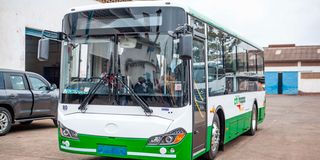Premium
Finance Bill a threat to climate change efforts

An electric bus pictured at Kenya Vehicle Manufacturer plant in Thika on August 15, 2024.
What you need to know:
- One glaring example of the lack of commitment to fighting climate change is the proposal to slap a 16 per cent VAT on solar, wind and geothermal inputs.
- With the Finance Bill, the currently zero-rated electric buses and bicycles are on the fast track to becoming exempt, with standard VAT looming on the horizon.
In recent years Kenya has been talking big about becoming the regional and continental leader in achieving net-zero emissions by 2050 and building climate resilient economy and communities.
Under the Long-Term Low-Emission Development Strategy (LT-LEDS) launched in 2023, the Government focus is on strategies for reducing emissions across various sectors, including energy, industry and agriculture. This net-zero target aligns with the global effort to limit global warming to below 2o Celsius and pursue efforts to limit it to 1.5o Celsius.
The plan emphasises a significant increase in renewable energy generation capacity, particularly solar, wind and geothermal, to meet growing electricity demand and reduce reliance on fossil fuels. It highlights the need for investment and financing to support the transition to a low-carbon economy, attracting investment and donor support for sustainable projects.
On paper, the government is all about transitioning to a low-carbon, climate-resilient development pathway, but the reality is a different story. Recently, on April 30, the Ministry of Environment proudly submitted Kenya’s Second Nationally Determined Contribution (NDC 2031-2035) to the United Nations Framework Convention on Climate Change, outlining plans to reduce greenhouse gas emissions by 35 per cent between 2031 and 2035. However, the proposals in the Finance Bill, 2025, unveiled the same day, seem to throw a spanner in the works.
One glaring example of the lack of commitment to fighting climate change is the proposal to slap a 16 per cent VAT on solar, wind and geothermal inputs. Currently, these are VAT exempt. If this proposal goes through, they will become expensive, putting a damper on investments in green energy.
Environmental curve ball
The Finance Bill is further shaking things up by suggesting a reclassification of VAT for electric bicycles and buses just after Kenya Power announced an ambitious plan to install 45 electric vehicle (EV) charging stations across six counties within the next 12 months to support the shift toward clean mobility.
With the Finance Bill, the currently zero-rated electric buses and bicycles are on the fast track to becoming exempt, with standard VAT looming on the horizon. The move is a step backward in Kenya’s dream of transitioning to electric mobility to catalyse reduction of carbon emissions, majorly driven by the use of fossil fuels.
The Bill further puts to question the government’s commitment to tackle climate change by proposing to move solar and lithium-ion batteries, and bioethanol vapour stoves from the zero-rated category to the exempt category.
In a country aiming to lead the way in green technology, these surprising taxation manoeuvres are a curve ball. Environmentalists are now crossing their fingers that Parliament can bring some sobriety and sense to the table to help the country dodge this environmental curve ball for a cleaner, greener future.
Mr Ngare is the editorial director at Big3 Africa. [email protected]


